
Ah, content predictions for 2018. I was tempted to say that all of my 2017 content predictions still apply, so let’s get to work. But, while I do feel those predictions extend through this year, I think their consequences will give rise to new content trends. So, with 2017 predictions in mind, let’s walk through more for 2018.
1. The Pace and Scope of Content Change Will Intensify and Require a New Mindset
Content operations are not immune to the unprecedented disruption we’re seeing in business thanks to digital. The World Economic Forum has identified this change as the Fourth Industrial Revolution, which Accenture CEO Pierre Nanterme describes like this.
We are seeing the Fourth Industrial Revolution emerge in a series of waves: the digital consumer, who enjoys more interactive and personalized experiences thanks to SMAC (social, mobile, analytics and cloud) technologies; the digital enterprise, which leverages SMAC technologies to optimize the cost of corporate functions and to transform enterprise collaboration for greater productivity; and the emerging digital operations wave, where companies are truly revolutionizing business with the use of artificial intelligence, robotics, cognitive computing and the Industrial Internet of Things.
The rapid pace and scale of disruption is unique to the Fourth Industrial Revolution. Digital companies can reach new customers immediately and at virtually zero marginal cost. They can compete in new sectors by collaborating with peers and competitors. They can massively improve quality and productivity by converging technologies and sources of data.
The ramifications of these waves of change for content are more numerous than my Instagram posts of Boss the amazing pit bull. The point I want to make here is that the change we face is more intense and constant than even a seasoned digital professional has experienced. It’s going to stretch the limits of change management practices. Content stakeholders who have not worked in digital and have not experienced much change (see my next prediction) are at high risk of freaking out. By that, I mean become scared and either paralyzed or engaged in fear-driven, negative behavior. Both of those possibilities will undermine, if not halt, progress on content strategy and maturing content operations.
The only way I see to cope is to embrace a new mindset. Companies will need to encourage and train their employees to shift or strengthen their mindset rather than rely solely on formal change management communication. The change will be too frequent for formal communications to keep up. I’m encouraged by Pew Research’s recent finding that 4 in 10 Americans now meditate at least weekly.
2. More Industries Will Have to Embrace Content Transformation As Part of Digital Transformation
Related to my first prediction, digital disruption is extending beyond industries such as technology to industries such as manufacturing. Digital disruption is also hitting industries such as financial services harder than ever before. I like the useful way the digital team at Thomson Reuters describes this state of affairs:
When things go digital, they start following a new set of rules. The rules of the physical world are either not applicable or are severely diminished. Things move from sparsity to abundance, where consumption does not lead to depletion. To the contrary, the more an object is consumed, the more valuable it becomes. Cost of production and distribution is no longer critical, and the concept of inventory is no longer applicable.
When things go digital, they also move from linear to exponential—a world in which new technologies and new players can enter and dominate an industry in just a few years.
This new set of rules will include content. To support doing business digitally, more and more companies will realize they need to deal with content in more sophisticated ways than they ever considered before. For example, think about a manufacturer of fitness equipment. Ten years ago, you would not think of such a company as digital or as needing much content. Today, the rise of the Internet of Things has made fitness equipment digital machines that can store myriads of programs and settings, play media content, and more.
To boot, innovators such as Peloton have combined equipment (the spinning bike) with content (subscription to online spinning classes) and expanded the business model from a one-time equipment sale to include a software as a service. Smart fitness equipment manufacturers are adapting. For example, Precor has developed an editorial process to meet new needs of their customers around the world—and Precor considers that process to be a business asset. Smart companies will follow Precor’s lead of transforming their approach to content as they undergo digital transformation.
3. Content Findability Will Be a Top Challenge
Our research found that content findability is a much more serious problem than you might think. When people experience difficulty finding the content they want or expect and eventually discover it, their view of the content becomes distorted. And not in a good way. No matter how high the content quality is, people will view the content as less useful, relevant, and even accurate than similar content that was easy to find. When finding content is difficult, that poor experience leaves a bad taste that lingers as people consume the content.
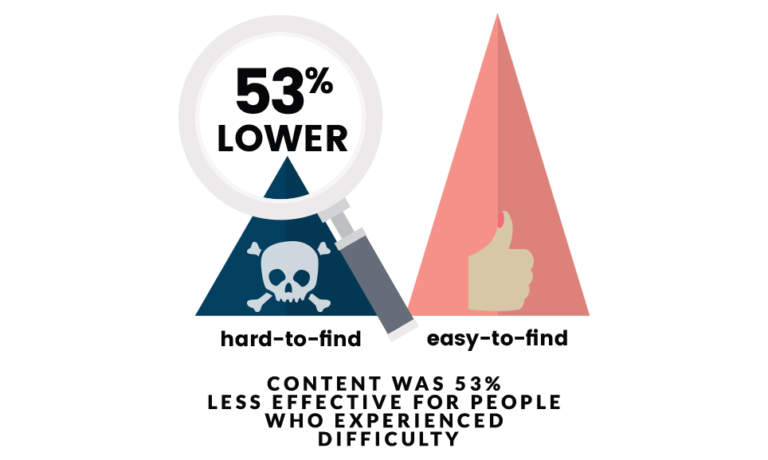
Learn more about the research here.
Improving content findability is a big reason why I expect my 2017 prediction that content “doers” will audit and consolidate content to extend through this year.
4. Artificial Intelligence and Machine Learning Hype Will Fade As the Real Work Begins
2017 was a year of unprecedented hype for artificial intelligence and machine learning. For content, the promise of taking content automation to more sophisticated levels is tremendously exciting. It is also a lot of work, especially if a company does not already have a firm foundation in structured content (content engineering) and delivering dynamic, personalized experiences. Creating an effective chatbot, for example, means you need the content that chatbot will deliver structured appropriately. I’ve talked to a number of digital strategy, user experience, and content professionals who have expressed a similar sentiment—setting up artificial intelligence takes more people power than they anticipated.
Further, much of the promise for delivering personalized experience requires having customer or user data. User data breaches such as the unprecedented Equifax breach in 2017 will cause more work in balancing personalization opportunities with privacy and security concerns.
5. Content Professionals Will Have More Leadership Opportunities
Whether you want to pioneer content strategy and more at a company that lacks it or become an executive at a company that wants to innovate or mature content operations, you will face a wide range of opportunities in 2018.
Round Up of Useful Predictions
‘Tis the season for predictions, but which ones are worth your time? I have found the following prediction sets particularly thought-provoking and, therefore, useful even if they do not all come true.
2018 Artifical Intelligence Predictions
By Thomson Reuters
Predictions for Journalism 2018
By Nieman Lab
UX Trends to Watch for in 2018
Joseph Dickerson of Microsoft shared his take in this piece for Content Science Review.
Are You Ready for Content Marketing in 2018? 60+ Predictions
By Content Marketing Institute
Look Out for The Content Advantage (Clout 2.0) in 2018
Almost exactly seven years ago, “Clout” hit the bookstores. The second edition will launch by June 2018. So much has happened in that time period, as these predictions highlight, so I’m excited to update and expand the book. I’m even adjusting the title to The Content Advantage (Clout 2.0). While I can’t predict what will happen, my hope is you will find the book to be a useful resource.
Events, Resources, + More
5 Secrets of Content Ops Success: Webinar
Learn how the most successful organizations scale and mature content operations. Based on our research with 700+ content leaders and professionals.
The Ultimate Guide to End-to-End Content
Discover why + how an end-to-end approach is critical in the age of AI with this comprehensive white paper.
The Content Advantage Book
Learn more about the much-anticipated third edition of the highly rated book by Colleen Jones. Preorder the electronic version.
20 Signs of a Content Problem in a High-Stakes Initiative
Use this white paper to diagnose the problem so you can achieve the right solution faster.
Workshop: Are You Ready for AI?
Is your organization really ready for AI at scale? Let the Content Science team guide your leaders through assessing 4 areas of readiness.
Upskill with Content Science Academy
Training for modern content roles through on-demand certifications + courses or live workshops.


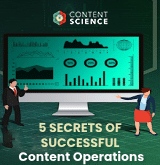
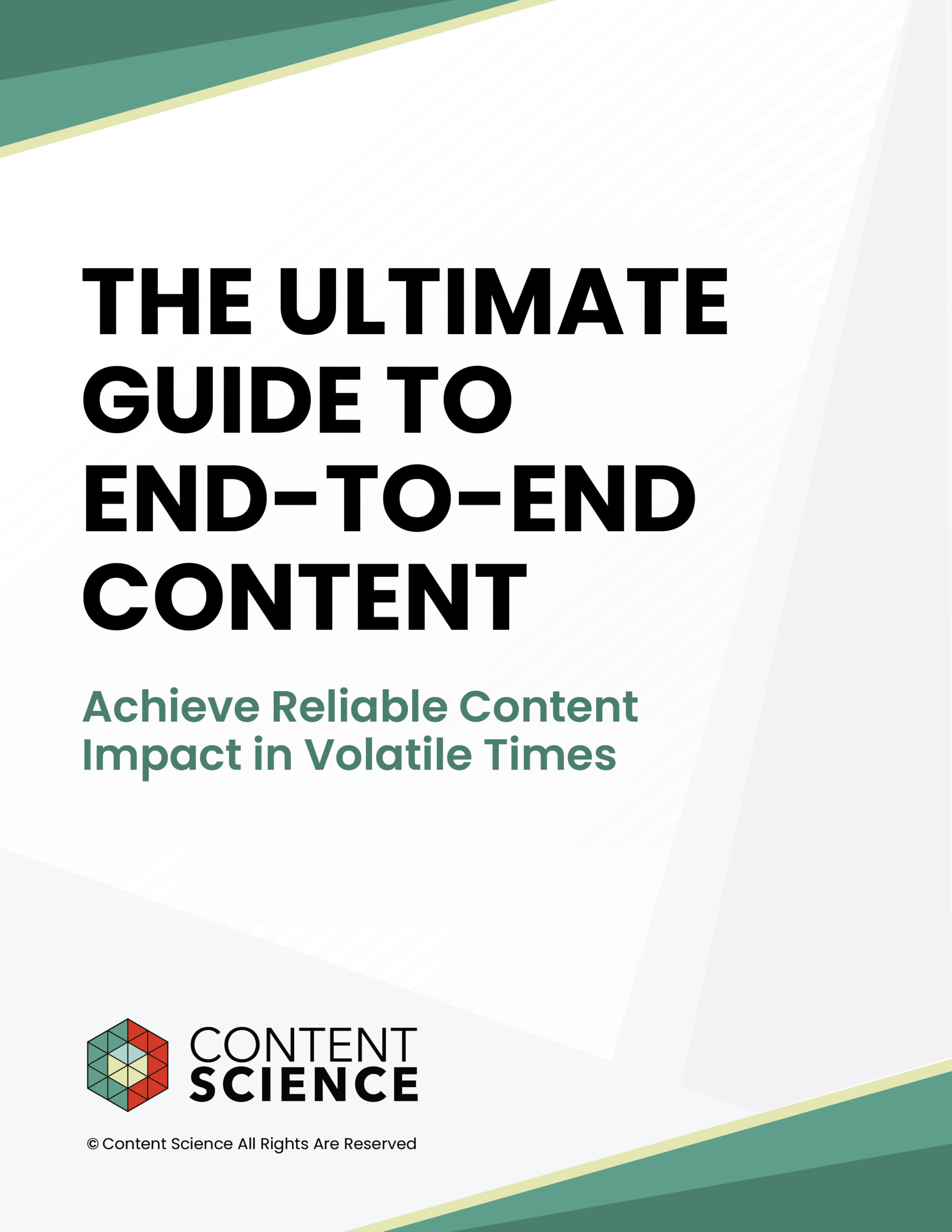
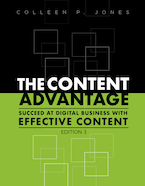
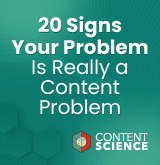


Comments
We invite you to share your perspective in a constructive way. To comment, please sign in or register. Our moderating team will review all comments and may edit them for clarity. Our team also may delete comments that are off-topic or disrespectful. All postings become the property of
Content Science Review.